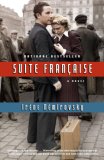Book Club Discussion Questions
In a book club? Subscribe to our Book Club Newsletter and get our best book club books of 2025!
For supplemental discussion material see our Beyond the Book article, and our BookBrowse Review of Suite Francaise.
Please be aware that this discussion guide will contain spoilers!
About This Guide
This guide is designed to enliven your group’s discussion of
Suite
Française,
Irène Némirovsky's masterpiece—a unique work of fiction
about the chaotic exodus from Paris in June, 1940, as the invading German army
approaches, and the complex life of an occupied village a year later.
- The novelist, who herself fled Paris on the eve of the Nazi invasion,
wrote the book virtually while the occupation was happening, most likely
making Suite Française the first work of fiction about World War II.
How do you think she managed to write while she herself was in jeopardy? Do
you think it was easier for her to capture the day-to-day realities of life
under occupation? In what ways might the book have been different if she had
survived and been able to write Suite Française years after the war?
- Suite Française is a unique pair of novels. Which of the two
parts of Suite Française do you prefer? Which structural organization
did you find more effective: the short chapters and multiple focus of
Storm in June, or the more restricted approach of Dolce?
- What is the significance of the title Dolce?
- How does Suite Française undermine the long-held view of French
resistance to the German occupation?
- Discuss Irène Némirovsky’s approach to class in Suite Française.
How do the rich, poor, and the middle classes view one another? How do they
help or hinder one another? Do the characters identify themselves by class
or nationality?
(You might consider the aristocratic Mme de Montmort’s thought in Dolce:
“What separates or unites people is not their language, their laws, their
customs, but the way they hold their knife and fork.”)
- In Dolce, we enter the increasingly complex life of a
German-occupied provincial village. Coexisting uneasily with the soldiers
billeted among them, the villagers—from aristocrats to shopkeepers to
peasants—cope as best they can. Some choose resistance, others
collaboration. Each relationship is distorted by the allegiances of war.
What happens when someone—who might have been your friend—is now declared
your enemy during a war?
- The lovers in the second novel question whether the needs of the
individual or the community should take priority. Lucille imagines that “in
five, or ten, or twenty years” this problem will have been replaced by
others. To what extent, if at all, has this proved the case? Has Western
society conclusively decided to privilege the individual over the group?
- How does Suite Française compare to other World War Two novels
you have read? How would you compare it to the great personal documents of
the war (for example, those written by Anne Frank and Victor Klemperer), or
to fiction?
- “Important events—whether serious, happy or unfortunate—do not change
a man’s soul, they merely bring it into relief, just as a strong gust of
wind reveals the true shape of a tree when it blows of all its leaves.” —Storm
in June, p.203. Do you agree?
- Consider Irène Némirovsky’s plan for the next part of Suite
Française (in the appendix). What else do you think could happen to the
characters?
SUGGESTED READING
The Diary of Anne Frank,
Charlotte Gray by Sebastian Faulks
Birdsong by Sebastian Faulks
The Regeneration Trilogy by Pat Barker
Night by Eli Wiesel
Unless otherwise stated, this discussion guide is reprinted with the permission of Vintage.
Any page references refer to a USA edition of the book, usually the trade paperback version, and may vary in other editions.
